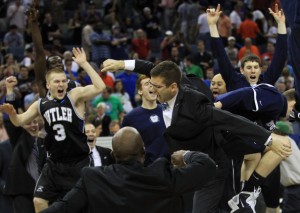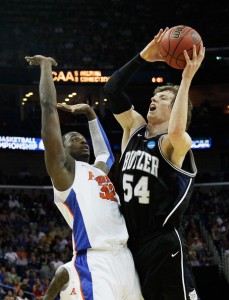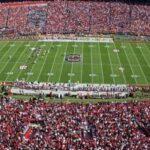Butler is Now One of the Big Boys
Since the NCAA Division I Men’s Basketball Tournament expanded to 64 teams in 1985, a school has reached the Final Four in consecutive years a total of 13 times. The list includes many of the usual suspects, Duke, Kentucky, North Carolina (twice), Michigan State (twice), Florida and UCLA among others. After their overtime victory Saturday night against Florida, the list now also includes the Butler Bulldogs.
As a private liberal arts school near Indianapolis with roughly 4,500 students (undergrad and graduate), Butler would seem to be an unlikely candidate to be known as a basketball powerhouse.
Yet, Butler is now clearly the poster child for a new era in college basketball where the gap in talent and ability between schools from the “power” conferences and the rest of college basketball is quickly shrinking.
Unlike the UNLV Runnin’ Rebels, which was the first non-power conference school to reach consecutive Final Fours from 1990-1991, Butler is not creating success by separating the two words student and athlete.
Instead, Butler has created a culture of success on the court while maintaining a high level of academic success.
Who Will Win the NCAA Men's Basketball Title?
- VCU Rams (52%, 15 Votes)
- Butler Bulldogs (21%, 6 Votes)
- Connecticut Huskies (21%, 6 Votes)
- Kentucky Wildcats (7%, 2 Votes)
Total Voters: 29
Since 2007, four Butler basketball players have earned Academic All-America honors, including 2011 Academic All-American of the year Matt Howard.
During that time, Butler has advanced to five consecutive NCAA Tournaments and won at least one tournament game four times.
Their run over the last two years is perhaps the most impressive of any of the 13 squads that have reached consecutive Final Fours because they have done it without the benefits associated with being a high tournament seed.
As a fifth seed in the 2010 tournament, Butler won three games over higher seeds before falling just short against Duke University in the Championship game.
This season as an eighth seed, Butler opened the tournament with a last second victory over #9 Old Dominion to advance to a second round matchup with top seeded Pittsburgh.
After edging the Panthers in a ferocious ending, Butler defeated higher seeds Wisconsin and Florida to reach the final four for the second straight year.
Over the last two seasons Butler has shown an uncanny ability to make the big play at the most crucial moment of a close contest. Of their nine tournament wins, six have come by four points or fewer.
An interesting component of Butler’s success is their 34-year-old head coach Brad Stevens. A former point guard at DePauw and an assistant at Butler from 2001-2007, Stevens has done an amazing job carrying on the legacy created by former coaches Thad Matta and Todd Lickliter.
In his four seasons at the controls, Stevens has posted a 116-24 record and is the youngest coach to lead a squad to the Final Four twice. After advancing to the title game a year ago Stevens signed a contract that would keep him at Butler through the 2021-2022 season. Given his second straight Final Four run teams will surely again be trying this year to lure him away from Butler.
However, given the great tradition he is growing with every victory and the fact that winning a national title no longer seems to be the sole domain of the big schools, Stevens may instead be content with turning Butler into a dominating program and consistent championship contender.
Butler is already the smallest school to reach the Final Four since the seeding process began in 1979. It may be just a matter of time before they take the next step and win the NCAA title.
















